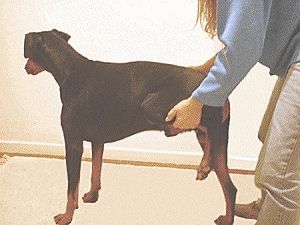McTimoney canine treatment
Why dogs can benefit from McTimoney animal therapy

Dogs' lives have their risks. Working dogs - performance dogs in particular - have to cope with additional stresses and strains to the musculoskeletal system. Police dogs work hard and have to jump huge heights in their training and racing greyhounds are subject to particular hazards such as constantly running round tracks in just one direction and bumping into each other while racing. Working sheepdogs are subject to risks of various kinds both while training and working, and even domestic dogs are liable to falls and bumps, traffic accidents and disc degeneration.
The dog's spine is fairly flexible and the joints between each vertebrae allows quite a range of movement such as curling up in bed as well as normal bending and stretching. However, sometimes through such things as a fall, or a bad slip, or skidding on a wooden floor the joint can suddenly be taken to the extreme range of its movement. This could also be caused by long term trauma such as always landing on the same leg when jumping, or repetitive twisting movements such as chasing a frisbee or taking part in agility.
Back problems causing lameness
When a joint in the spine is taken to its extreme range of movement the muscles tighten around it to stop it going any further. It's just the body's own way of protecting itself. This muscle tightness holds the joint in a fixed position causing it to become misaligned with its neighbours. Most misalignments resolve themselves through normal spinal movements such as bending, twisting and rolling, but some can and do persist as the muscle may go into spasm, causing discomfort and even nerve irritation.
Some of the symptoms the dog may show are:-
- having difficulty jumping up or down
- crying when getting up or lying down
- a reluctance to play or exercise
- a change in posture a change in behaviour
- lameness or limb dragging
- pain or discomfort
This is when an outside influence such as an adjustment is usually required. McTimoney animal therapy is a whole body treatment and is a relatively gentle technique which delivers a short sharp thrust to a specific area in order to release muscle spasm, return the joint to its normal range of movement and create the right conditions for the body to heal itself.
After the treatment the dog will need to rest for 24 hours. He/she may feel a little bit stiff or sore, may feel very sleepy or drink more than usual - however this is perfectly normal.
Increasingly, vets are happy to refer their clients to suitably qualified practitioners when they feel that this type of treatment would benefit the animal.
One vet, who refers a number of dogs to an animal practitioner says:
"Problems associated with the spine are very common among dogs, and there is not a lot you can do conventionally, apart from painkillers and anti-inflammatories, which don't really get to the root of the problem. Nowadays anything I think might involve the spine, I would refer to an animal practitioner.
This treatment can also alleviate some arthritic conditions. A dog may walk awkwardly because of arthritis or adopt particular postures to alleviate the pain. These can lead to muscle spasm, sometimes in areas quite remote from the arthritis itself, and can be helped by this type of treatment. As dogs get older they get weaknesses in the spine and back legs and can be helped in this way too. A good proportion of these dogs either improve or stop degenerating."
Contact Jill to discuss your animals' problems and possible solutions.